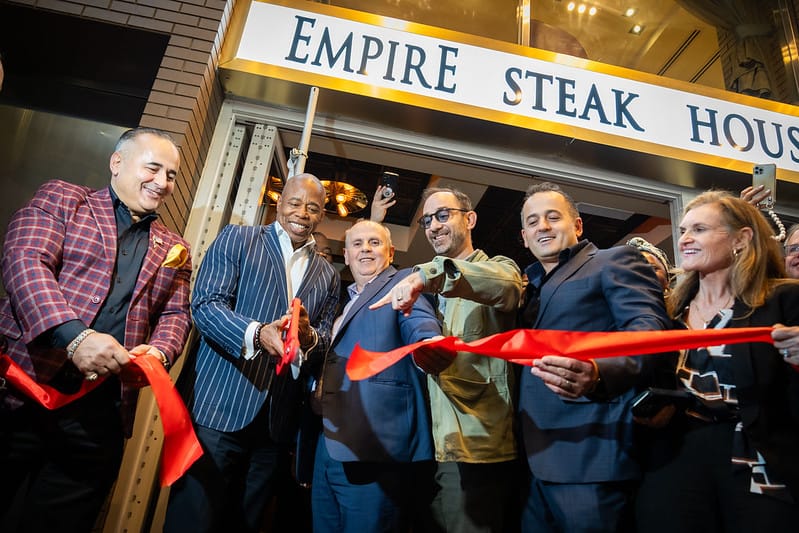So what’s everyone doing to fight the mayor’s massive budget cuts?
The mayor’s plan would ax funds for sunday libraries, pre-K, composting and more, but some are pushing back

By Tim Donnelly
Everyone is broke! It’s the talk of TikTok right now, and Mayor Eric Adams, forever riding the vibes, wants you to know that New York City is no exception. The city of “yes” is becoming the city of “we have yes at home” this month after Adams announced major budget cuts that could drastically reduce some of the most basic public services, from pre-K and litter pick up to Sunday library hours and composting across the five boroughs.
Cutting basic things that benefit everyone in the richest city in the country during several overlapping crises at the start of winter, while the rich are building their own private hospitals so they never have to even look at the rest of us? This economy seems to be working great, to me.
The mayor says there are lots of reasons for the cuts but the main one is the crisis of asylum seekers who have flooded the city for the past year, straining shelters, resources and time. Critics say the mayor could have handled that situation much better — and it’s not the only financial problem he’s created. And that's all combined with the end of federal pandemic aid money.
Not everything is a done deal yet — the City Council will hold an oversight hearing on Dec. 11 that you can attend (more on that below) — but some of it is very likely to affect all New Yorkers very soon. And people who pay attention to this stuff are worried it’s going to get worse.
“When you're in this fiscal climate where the mayor is unpredictable and slashing budgets that he promised money for, nothing is reliable at that point,” one longtime Health Department official lamented to The Groove. “Anything can go. What worries me: even the things that are stated as priorities can go.”
Now, this could all be an attention-seeking gambit to get more funding from the feds and the state to cover the costs of the asylum seeker influx. But folks are still sweating, and fear the cuts will happen anyway.
Is this really really a financial crisis?
It’s understandable to suffer a Chicken Little effect when it comes to the city’s budget cuts. It feels like every year or so there is a panic about cuts to schools, libraries or parks, and everyone is told to pester your representatives every day until they cower in fear at the power of many annoying phone calls.
But this one is indeed different. I called up Ana Champeny, vice president for research at the non-partisan Citizens Budget Commission, for some context. She said that while the city has faced cuts before during big economic downturns, these are much more significant. For one, the city spends more money now than it did in 2003.
“It’s not completely unprecedented, but they are significant in terms of the dollar amount,” she said. “Back then, the budget was smaller.”
City workers are feeling the pinch of the mayor’s hiring freeze too. It doesn’t help that they’re being paid overtime to work the migrant shelters — something the Health Department official said takes even more resources away from already strained agencies trying to do basic city work.
“Get New York Cares to fucking do that,” the official said.
It all adds up to unprecedented cuts, and unease, across the city.
“This type of stuff happens, but this seems above and beyond,” the Health Department official said. “This has been the worst [proposed cuts]. This one seems bad too because there’s not a lot of information that’s coming with it.”
Composting is in trouble, but the brown bins will stay
We all got so stoked about the expansion of curbside food scrap collection this year, an achievement in both the city’s climate goals and its war against smells and rats. Since then, our enthusiasm has dulled a bit. Most of the food scraps you throw in the brown bins for curbside collection are not, to be clear, becoming compost — even though the word “compost” is written all over them.
They’re processed and turned into biogas, which — despite the green-sounding name — is full of methane and is “chemically identical to fossil natural gas,” as Aaron Gordon reported for Vice last year. (When food waste ends up in landfills, it emits methane gas into the environment too.) The collected food scraps that are turned into gas were supposed to be used to heat buildings, but that program stalled this month.
All that is to say that when the mayor talks about cutting composting, he’s not talking about the brown bins or the bluetooth-operated smart bins. He’s talking about the actual composting programs that take your food scraps at community gardens, farmers markets and other drop-off points, and mulches them to grow new stuff, which is good for the planet in loads of ways. Under the cuts, those places have to shut down their city-funded programs by the end of the year. That means your only option to dispose of your food scraps will be into the brown bins, where they may get turned into methane and flared off.
NYC greenwashing in full effect. Only about 1/3 of the food waste that is said to be composted is actually composted while the rest is methane biogas. If they composted 100% there would be no methane produced. https://t.co/LOWJp44VtF
— E Meow (@emeowwww) May 11, 2023
“By eliminating the current composting sites, we take a step backwards in terms of rolling out more composting infrastructure,” Justin Green, executive director of Big Reuse, one of the composting sites, told The City. The City’s breakdown of the biogas vs actual composting, is worth a read.
GrowNYC has been circulating a petition to save community composting with 32,00 signatures already; if that will do anything, I don’t know, but it never hurts.
The Save Our Compost account on Instagram is tracking other efforts around it, and they’re holding a rally today (Nov. 30) from noon to 2 p.m. at City Hall, and are planning a press conference for Dec. 6.
Libraries face the Sunday scaries
As of now, the last day for Sunday service at New York City’s library systems will be Dec. 17, which means you will soon no longer be able to get Chick-fil-A OR check out a cute bibliophile on a Sunday anywhere in this whole city. There goes another place you’re allowed to exist without having to spend any money.
More importantly, the libraries are places that people rely on for services everyday of the week, whether it’s families in need of a place to take their kids, students who need to borrow laptops or the unhoused who need a warm place to be during the day.
After Dec. 17, only one library branch in all five boroughs will be open on Sundays: The Kew Gardens Hills Branch of the Queens Public Library, out by Flushing Meadows Park. You don’t have to live in Queens to get a Queens library card, so anyone can use it, if you're willing to travel.
Return of the trash
Sanitation has been a major focus for Mayor Adams so far — and it’s one he’s actually been doing a good job at. Street bin collections have increased, long-awaited containerization efforts are finally freeing some neighborhoods from ugly mountains of trash bags and food scrap collection has expanded. Now all that might take a step backwards.
The announced cuts mean street litter bins (not household waste) will be picked up less frequently. Other programs are on the chopping block too including e-waste pickup in Staten Island and an expansion of curbside food scrap pickup in Staten Island and the Bronx. [Update: A Sanitation Department spokesman clarified that "cuts to litter basket service will mean the removal of some litter baskets. Any basket still on the street will be serviced at current levels." The department is also, he said, still committed to expanding compost services to Staten Island and the Bronx, but that will be delayed seven months until October.]
All that is rough in a city where, despite the improvements, trash cans are still often overflowing (as we wrote about here) and that trash ends up in the street and then in storm drains which can lead to more flooding (as we wrote about here too). I’m not sure what to tell you about this one except to stop creating so much trash? Bring your reusable coffee mug once in a while and stop throwing your trash in a fucking schoolyard? The good news is sanitation may be spared further cuts, but no one can say for sure yet.
Not-so-universal pre-K
One of the city’s greatest equalizers is its universal pre-K program, which saves families thousands of dollars a year. That program now faces $120 million in cuts that won’t take effect until next school year, but advocates worry that it could mean some kids will end up without seats in preschool.
To fight back, parents are organizing. A group of parents called New Yorkers United for Child Care held a kickoff meeting at the Bell House in Gowanus last week. Find out more about what they’re up to here.
Some of those parents said they’d consider moving out of the city if the universal pre-K gets cut. That creates a dilemma for the administration: the mayor needs to make sure people stay in the city to keep property tax income flowing.
“That is a significant cost for families, only second to housing,” Champeny said. “That is a really big big challenge to maintaining New York's attractiveness for those families.”
Will the City Council do anything??
They’re going to try! But the budget process in the city tilts heavily in favor of the mayor.
Council Member Justin Brannan, chair of the council’s Committee on Finance, said part of the budget crunch is because the city “relied far too much on expensive emergency contracts with *for-profit* companies that have milked the city for billions.”
🧵NYC budget gaps are real but not a surprise and largely due to the end of federal COVID stimulus $$. Costs related to migrant influx are obviously a piece of this puzzle but certainly not the only piece. If it were *just* the migrant crisis, we would not have these gaps.
— Justin Brannan (@JustinBrannan) November 28, 2023
The council is putting together its own plan that calls for tapping some money from savings and digging quarters out of the couch by collecting fines and other things. The city can’t raise or create its own taxes without approval from the state government, with the exception of the property tax rate, which Brannan and others said they don’t want to do. Read more about that plan here.
That committee is holding an oversight meeting about the mayor’s plan on Dec. 11 at 10 a.m., which is your chance to go and make a big stink or at least get your public comments recorded on it.
You can always contact your own City Council Member to tell them how you feel about the cuts. It’d be nice not to have to constantly beg your public officials for basic services, but that ain’t the world we live in.
Champeny gave me some optimism, saying that budget cuts are often cyclical, and that they can be a chance to make things more efficient in the way the city is run.
“This is not the new level that we have to stay at,” she said.
The upside to all this? At least the police unions are mad at the mayor too.




Comments ()